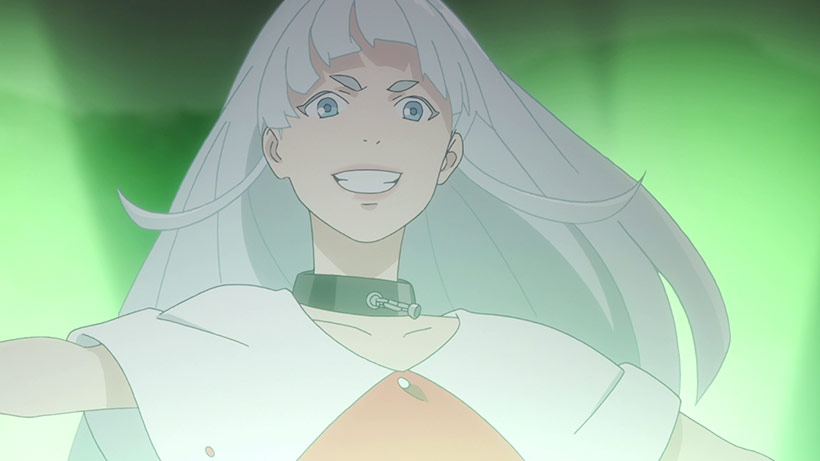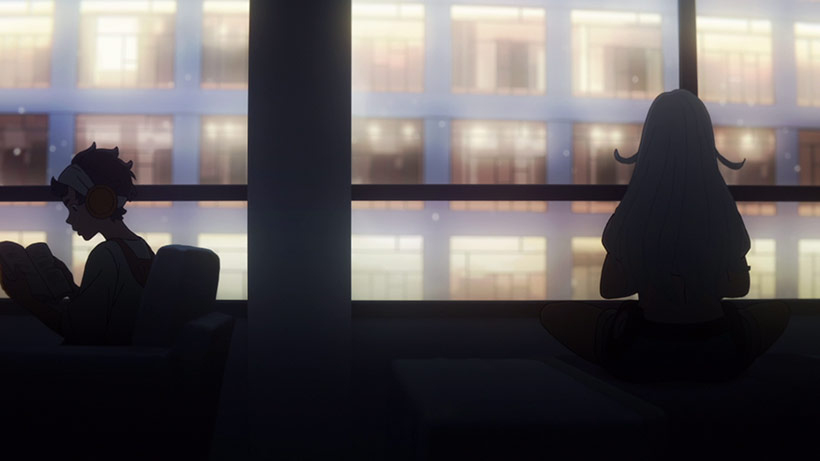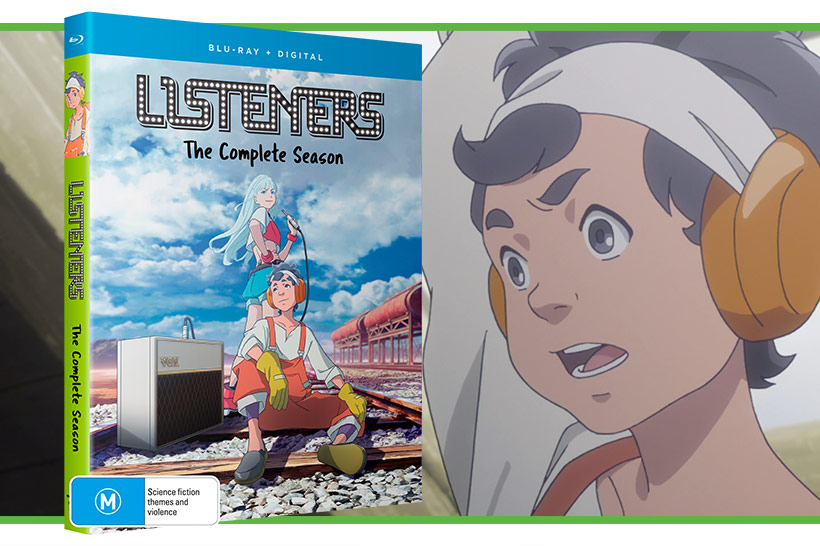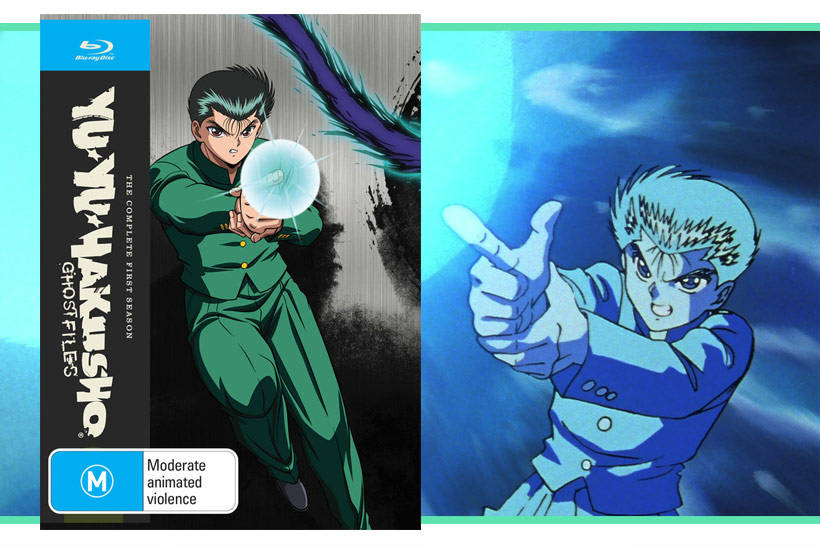Listeners’ post-apocalyptic tale of the passion of youth in a world seemingly devoid of music has all the trappings of kitschy musical theatre, but viewed through the lens of a modern anime production creates a very interesting story.
Set in an unusual dystopian future void of music, one day in the city of Liverchester a scrap-hunting amateur audio engineer, Echo Rec, crosses paths with Myu, a mysterious girl who has lost her memory but has the capacity to control transforming mecha called Equipment as humanity stands off against the mysterious and deadly Earless. When Echo’s valve amp, AC30, transforms to become Myu’s personal mecha biffo machine and defeats a band of hulking Earless the two embark on an adventure to discover the truth to Myu’s past and see more of the world in the hope of defending others against the mysterious hulking entities.

My initial impression was that Listeners kind of gave off a FLCL crossed with a Now and Then, Here and There vibe based on the art direction. In practice though, the show certainly doesn’t seem to echo the surreal and psycho-sexual energy of the former nor does it languish amongst the challenging isekai atmosphere of the latter. In fact, the first episode kicks off with a shounen giant-robot save the world energy with the usual backdrop of intrigue that promises a hero’s journey which left me a little disappointed since it seemed a little twee compared to my expectations.
On reflection, there’s possibly a little truth to all of those elements – it starts off with a somewhat uninspiring “wunderkind boy sets out on a journey to save the universe through positivity and robots”, but foremost here is the realisation that this is a passion project cooked up by a bunch of musos and music fans bouncing ideas on how to transform their passion for rock music into an animated TV series. In many ways it feels like the plot elements are designed as a response to the music itself, the eras that inspired their creation and the iconic cover art from the creators’ treasured collection of LPs from their youth and finding a way to express this through the cultural lens of a country physically and culturally distant to the American or English music scenes.

Some of the references are more obvious in a broader pop cultural vantage point – Denka’s an unmistakable homage to Prince while McGee is a reference to the exec which signed Oasis. The drug Teen Spirit’s clearly a reference to Nirvana’s cult anthem while the superb (and delightfully surreal) tenth episode is a reference to Robert Johnson and the Mississippi town he grew up in. Myu is named for the vacuum tube, a piece of engineering intrinsically linked to historical and contemporary music production and playback, she wears around her neck while the three sisters who make their first appearance in episode 2 are a reference to the German experimental rock band Einstürzende Neubauten who made their debut in 1980.
The premise for the giant robots are the result of old amplifier technology that can be activated into combative mecha by plugging a 6.35mm phono jack into a Matrix-like techno-organic connector present in the body of a Player which triggers a transformation and resultant biffo. While the show doesn’t revel into the sexual suggestibility otherwise possible, combining this odd choice of action trigger with the art direction almost feels like it’s taken some inspiration from the the cult 1981 North American-animated film Heavy Metal and its fusion of hard rock and sci-fi techno hyperbole.

It’s kind of insane, and it’s the intense creativity that ultimately helps Listeners elevate itself above what should be a pretty standard shounen mecha show. On the surface there’s plenty to enjoy, even though part of me wishes the fighting sequences were hand-animated instead of relying on CG models. However, if you appreciate the wide variety of music nerdery on offer there’s a whole slew of additional content to enjoy.
What holds Listeners back from nailing it is the focus and deft hand needed to bring it to that next level. The main characters have promise in terms of their evolution, but it doesn’t quite get there. The idea of using eras of rock music to create distinct regional identities in the post-apocalyptic setting sometimes lack the subtlety to raise it above a bunch of passionate music fans fanboying out in creating their world view, including folding in lyrics (impacted by our good friend Copyright from being presented accurately) and other elements into the dialogue. Where there are opportunities to get surreal, it leaves it as an isolated event instead of embracing the unconventional more broadly. The anti-military messaging present in the final arc tries to get its point across, but feels a little shallow and played-out.

It’s a hard line to hold though, and those moments where it pulls the pieces in at the right pace make Listeners an enjoyable anime that you can’t help but be impressed with despite the parts where it struggles. It feels interesting and inventive which should be encouraged, and the lack of overt sexual exploitation with Myu in particular was welcomed.
As a point of comparison, Watanabe arguably plays out Cowboy Bebop against a backdrop heavily influenced and stylised by music and reinterpretations of popular culture, something Listeners is trying to explore in its own way. It doesn’t quite get there, but the elements remain novel and engaging. Which, interestingly, is something that could be said about Watanabe’s Space Dandy, another anime that nails it every now again so well you can forgive the less ambitious episode arcs.
For the local release of Listeners, Madman have once again brought over the Funimation Region A release with the requisite rating sticker, so you get the lovely cardboard outer sleeve which holds the standard Blu-Ray box and discs. The encoding is great and it’s a bilingual release, but what I really appreciated about this one is the inclusion of the original Japanese opening credits and the excellent bonus features, including a full copy of the Funimation Con 2020 panel on Listeners as well as a surprisingly candid interview with the Japanese creative staff. We don’t tend to get extras like these on modern releases, and while I’m as guilty as anyone for happily prioritising space for encoding quality, it was a really great fit given the very particular enthusiasm the team had for Listeners.

Listeners is, ultimately, a passion project trying to explore a love of decades of rock music by way of a contemporary anime production. Its success is highly variable depending on your vantage point, but there are enough positive qualities here that make it a journey worth exploring.
A review copy was provided by Madman Entertainment to the author for the purpose of this review.





